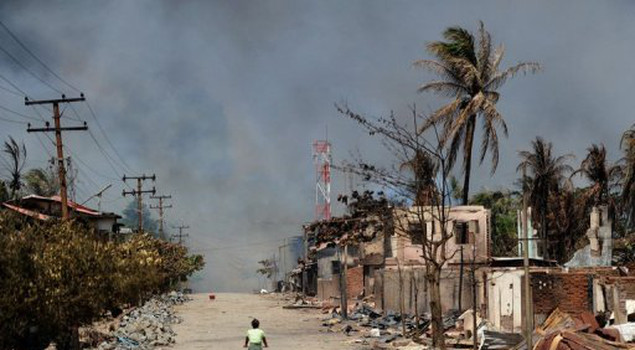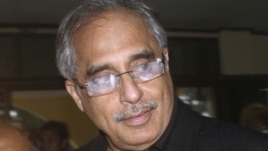BANKGOK - The U.N.’s special envoy to Burma, Vijay Nambiar, returned Thursday from a visit to Burma's western Rakhine state, where sectarian violence has killed 21 people and destroyed scores of homes.
Nambiar said he spoke with people caught up in the violence who are still "in a state of shock," and unwilling to return to their homes. There has been widespread violence in the area recently between Buddhists and Muslims, who are members of the ethnic minority known as the Rohingya.
Speaking to VOA by phone from the Burmese capital, Rangoon, he said the city of Maungdaw, where the conflict erupted, is now largely calm, but that the situation in the state's capital Sittwe is still tenuous and he was unable to visit some areas. Nambiar confirmed that 21 people died in the fighting.
Nambiar praised both the Border Affairs minister who traveled with him, and President Thein Sein, who responded by sending in the military to bring the situation under control, and declaring a state of emergency he described as "prompt, firm, and sensitive."
"This is an issue which has the potential of impacting on the entire reform process and requires to be handled very sensitively and in line with the international norms of international conduct," he said.
Burmese President Thein Sein said he is committed to equal justice and the rule of law in dealing with the aftermath of the conflict, he added.
Rohingya have long been viewed by the government and most Burmese as immigrants who are not entitled to citizenship or other benefits of the state. The recent fighting has led to a rash of inflamed rhetoric on websites and in domestic media coverage against Rohingya.
Violence broke out on June 3 when a mob of Buddhists in Rakhine allegedly attacked a bus and killed 10 Rohingya passengers in apparent retaliation for an earlier rape and murder of a Buddhist woman, allegedly by three Rohingya.
It will take time to address the longstanding ethnic and sectarian tensions, said Nambiar.
"I think increasingly everybody is conscious of the need to move away from such kind of ethnic stereotypes and characterizations of this nature because they realize that that is harmful to the entire project of reform," he said. "And I think while it is true that the messages that are being purveyed by being stressed by the top leadership need to filter down to the lower levels and there is still a lot of work to be done."
U.N. refugee agency official Preeta Law, a deputy representative in Burma, warned the fighting could have an impact on the effort to resettle Rohingya refugees now living in camps across the border in Bangladesh. "Of course in a situation of this kind of violence that's happened right now, in the immediate term, this would not be something that we would be looking at at this time," Law said.
Boats carrying women and children fleeing the violence have been turned back by the Bangladeshi government, despite the agency's plea to keep their border open.
Nambiar said he spoke with people caught up in the violence who are still "in a state of shock," and unwilling to return to their homes. There has been widespread violence in the area recently between Buddhists and Muslims, who are members of the ethnic minority known as the Rohingya.
Speaking to VOA by phone from the Burmese capital, Rangoon, he said the city of Maungdaw, where the conflict erupted, is now largely calm, but that the situation in the state's capital Sittwe is still tenuous and he was unable to visit some areas. Nambiar confirmed that 21 people died in the fighting.
Nambiar praised both the Border Affairs minister who traveled with him, and President Thein Sein, who responded by sending in the military to bring the situation under control, and declaring a state of emergency he described as "prompt, firm, and sensitive."
"This is an issue which has the potential of impacting on the entire reform process and requires to be handled very sensitively and in line with the international norms of international conduct," he said.
Burmese President Thein Sein said he is committed to equal justice and the rule of law in dealing with the aftermath of the conflict, he added.
Rohingya have long been viewed by the government and most Burmese as immigrants who are not entitled to citizenship or other benefits of the state. The recent fighting has led to a rash of inflamed rhetoric on websites and in domestic media coverage against Rohingya.
Violence broke out on June 3 when a mob of Buddhists in Rakhine allegedly attacked a bus and killed 10 Rohingya passengers in apparent retaliation for an earlier rape and murder of a Buddhist woman, allegedly by three Rohingya.
It will take time to address the longstanding ethnic and sectarian tensions, said Nambiar.
"I think increasingly everybody is conscious of the need to move away from such kind of ethnic stereotypes and characterizations of this nature because they realize that that is harmful to the entire project of reform," he said. "And I think while it is true that the messages that are being purveyed by being stressed by the top leadership need to filter down to the lower levels and there is still a lot of work to be done."
U.N. refugee agency official Preeta Law, a deputy representative in Burma, warned the fighting could have an impact on the effort to resettle Rohingya refugees now living in camps across the border in Bangladesh. "Of course in a situation of this kind of violence that's happened right now, in the immediate term, this would not be something that we would be looking at at this time," Law said.
Boats carrying women and children fleeing the violence have been turned back by the Bangladeshi government, despite the agency's plea to keep their border open.
UN envoy visits unrest-hit Myanmar
A UN envoy arrived in Myanmay after a state of emergency was declared in Rakhine state, which has seen a deadly rise in sectarian violence. Bangladesh has turned down calls from the UN refugee agency UNHCR to let in the fleeing Rohingya.

A state of emergency has been declared in Rakhine state, which has been rocked by a wave of rioting and arson, posing a major test for the reformist government which took power last year.
A dusk-to-dawn curfew has been imposed in many areas.
Vijay Nambiar, UN chief Ban Ki-moon's special adviser on Myanmar, flew into the capital of Rakhine to visit Maungdaw, a town near the border with Bangladesh where the violence flared on Friday.
He was accompanied by Myanmar's Border Affairs Minister General Thein Htay and 15 Muslim religious leaders from Yangon.
"We're here to observe and assess how we can continue to provide support to Rakhine," Ashok Nigam, UN resident and humanitarian coordinator who was also in the group, told AFP.
An uneasy calm pervaded Sittwe, which has been rattled by gunfire in recent days and was drenched by heavy rains on Wednesday.
Local residents have been seen roaming the streets wielding knives, swords and sticks, while people from both the mainly Buddhist ethnic Rakhine and Muslim Rohingya communities have been forced to flee their homes.
The Buddhists and Rohingya have both accused each other of violent attacks.
The UN has evacuated most of its foreign staff from Maungdaw, which is its main base in the state and has a large population of stateless Rohingya Muslims.
Around 25 people have been killed and a further 41 people were wounded in five days of unrest, an official told AFP on Tuesday. He did not give details of how they died or whether they were Buddhists or Muslims.
Rohingya leaders say the real number of dead is much higher but AFP could not verify the allegation and has been unable to visit many of the affected areas for security reasons.
The toll does not include 10 Muslims who were killed on June 3 by a Buddhist mob in apparent revenge for the rape and murder of a woman, sparking the violence in Rakhine.
Rakhine, a predominantly Buddhist state bordering Bangladesh, is home to a large number of Muslims including the Rohingya, described by the United Nations as one of the world's most persecuted minorities.
The Myanmar government considers the Rohingya to be foreigners, while many citizens see them as illegal immigrants and view them with hostility, describing them as "Bengalis".
Hundreds of Rohingya, many of them women and children, have attempted to flee to Bangladesh in rickety boats in recent days, but have been turned away.
Border guards on Wednesday said they had refused entry to another three vessels, although a single six-week-old baby girl found floating alone in a boat was rescued and placed with a local family.
The Dhaka government has rebuffed international calls, including by the UN refugee agency UNHCR, to let in the fleeing Rohingya.
The United States has urged an immediate halt to the sectarian unrest.
A leader of Rohingya refugees living in Bangladesh camps appealed for help from Aung San Suu Kyi on Wednesday, accusing the democracy icon of ignoring the plight of the minority group, who the UN says has suffered decades of discrimination in Myanmar.
"Aung San Suu Kyi hasn't done or said anything for us, yet the Rohingyas including my parents campaigned for her in the 1990 elections," Mohammad Islam, of Nayapara camp in the border town of Teknaf, told AFP.
A spokesman for the opposition leader's National League for Democracy party said the former political prisoner had instructed him to work "to help both sides equally" before she left Wednesday on a historic trip to Europe.
The veteran activist, who will formally accept her 1991 Nobel Peace Prize in Oslo on Saturday, has remained largely silent on the unrest apart from calling for "sympathy for minorities", while key figures in the democratic movement have said the Rohingya are not one of Myanmar's ethnic nationalities.

No comments:
Post a Comment